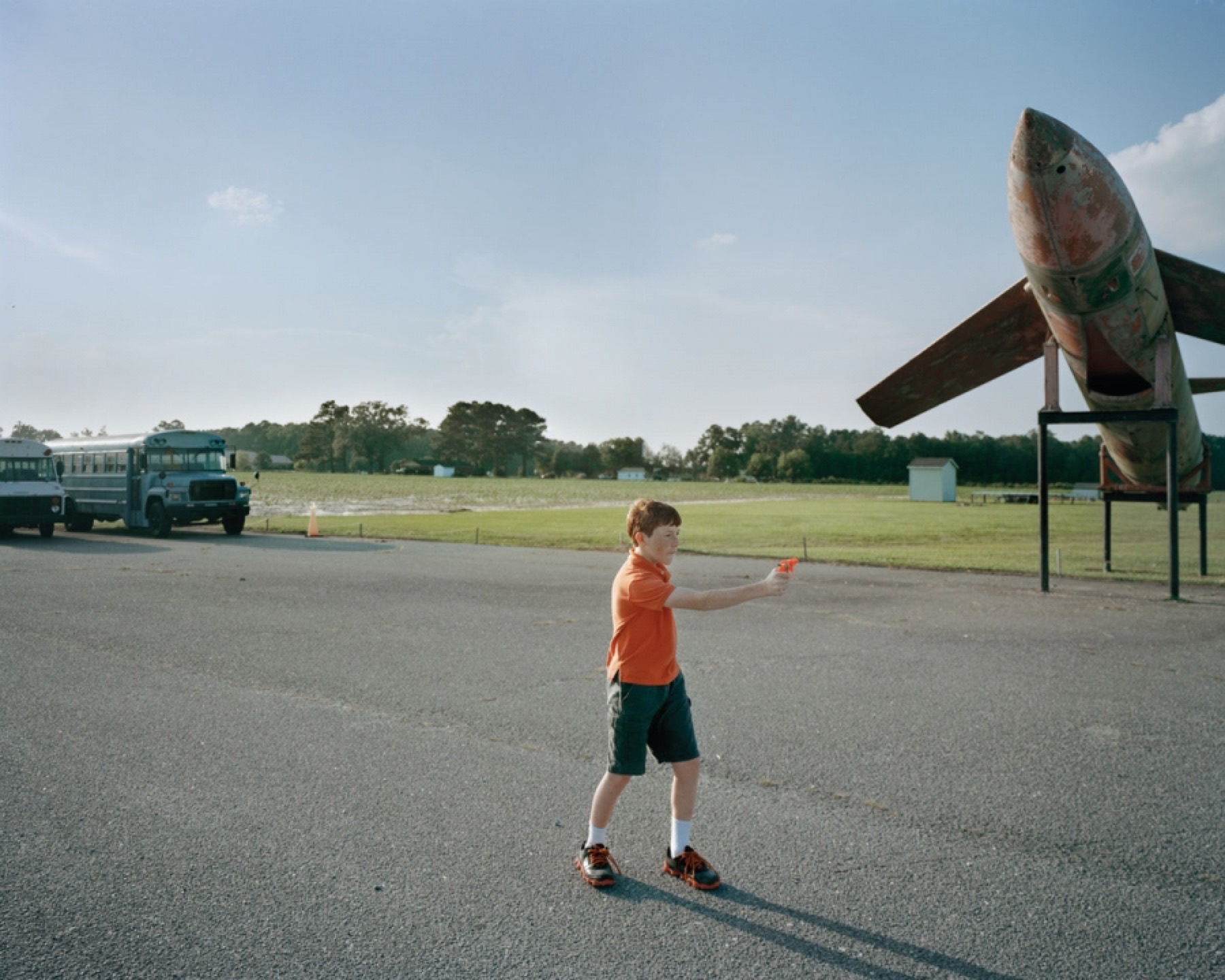Dollar General
By Erika Meitner

"Matthew, Eureka, NC," by Aaron Canipe, from the series Plateau
At the Dollar General before Christmas
a woman muttering to herself in Gift Wrap
picks out a roll of pastel paper that’s clearly meant
for a baby shower—ducks, bottles, lavender
safety pins—then asks me if I think it’s all right
for a baby shower. I tell her it’s cute, and
when she holds up two enormous cotton-candy
pink gift bows, and asks me to choose, I point
to the one with small pink feet dangling in plastic
from the bow’s center, which looks cheaper
than the plainer option, but more festive,
and who doesn’t like festive? Everyone in town
is buying stocking stuffers, and in the next aisle,
a familiar woman juggling bubble bath and pencils
waves hello—I only know her as Kate’s mom—
and she’s actually wearing one of those
floor-length green and red wool plaid skirts
featured exclusively in holiday catalogs with
faux family photo spreads of tree-trimming
parties. Near a pyramid of cookie tins,
there’s a kindergarten teacher I also recognize
from my son’s school, out with her teenage son,
loading up on frozen pizzas and Sunbeam bread.
What are the details I’ve left out? That I’m not
poor. That I’ve never had to buy food
at the Dollar Store at the end of the month.
That I’m relentlessly straightforward lately,
which has to do with my need to tell you
exactly what happened, because what happened
is so unclear. There is never enough information
about my neighbors, about the ways in which
people live. I’ve been living in the South now
for most of my adult life. You shall love your
neighbor as yourself, says Leviticus 19:18,
and the Hebrew word for neighbor is ray’ah,
meaning friend, companion, fellow, other. I am
neighbor and other. I am a Jew and the mother
of one white son and one black son. I’ve been
writing about guns lately, but this is not really
a poem about guns—it’s about Christmas, though
some people think I’ve declared war on the holiday
when I wish them Happy Holidays instead of Merry
Christmas. We are the only Jewish family in the
neighborhood, which isn’t a problem, except
around holiday time, when I’m sure our house
is the saddest on the block because it is unlit.
When we had lunch to chat about adoption,
my neighbor—my neighbor who is also
infertile—my neighbor, whom I do not see
in Dollar General—my neighbor, who has three
Christmas trees in her house and garland wrapped
on every handrail and mantel—she asks me about
the home study process: when a social worker
comes to your house to assess how you live,
what kind of family you are, whether you have
fire extinguishers on each floor and keep your
firearms locked up. Make sure your firearms
are locked up, our social worker would say
on the phone before each visit, and I’d remind her
that we own no guns. What kind of people own guns?
I’d think as I hung up the phone. My neighbor
and I share a plate of onion rings and become
teary over our intimate infertility heartbreak.
She says, good thing I got John a new
gun safe for Christmas. On clear days, when
I walk the roads, sometimes with my neighbors,
I hear people shooting off their weapons
at the firing range in the distance. Which is
to say it’s not surprising that in the past year
there have been over thirty-thousand gun
deaths in the United States. Which is to say
there are many people I have compassion for,
like the woman in the gift wrap aisle who maybe
had some kind of slight disability. And there are
many things that make me furious, like the fact
that we pay our schoolteachers so little
they have to shop for groceries at Dollar General
at the end of the month because smaller quantities
cost less. My son’s first grade teacher runs
a family side business called Ruttin’ Camo &
Grafix where she and her husband sell
Redneck Stemware in camouflage patterns
made from mason jars, and also custom hydro-
dipped firearms. In their Etsy “About” section
they say they are a small family-owned business.
They say they started putting hydrographics
on mason jars on a whim, to help pay for expenses
at gun shows. At gun shows in Virginia, you can
still purchase a gun, a high-capacity magazine,
an assault weapon with no background check
or waiting period. You need only be 18 and
bring two forms of ID. You can walk off with your
purchase. We’ve seen my son’s first grade teacher
working her family booth at craft fairs, at the Pumpkin
Patch next to the Kettle Corn folks. I always
make him go over to her and say hello.
She is quite strict so he doesn’t always want to,
but I push him toward the camo’d mason jars
on their leggy stems. Say hello to Mrs. Giles,
I say, and he does. What are the details
I’ve left out? That this year I asked my husband
to hang icicle lights from the eaves.
That each night before bed, one of us opens
the front door, unplugs the extension cord
and the house goes dark.


